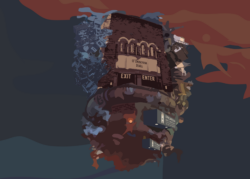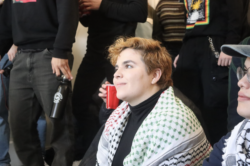Taking the stage in the ICC Auditorium, Kazuko Yamashina covered the podium with paper cranes. With the help of an interpreter, she explained that the cranes represent her dead mother, father, sister and brother, who died in the bombing of Nagasaki, Japan. “I was the only one that survived,” Yamashina said.
A slight woman, with short black hair sprinkled with white, Yamashina is a “hibakusha,” a survivor of the atomic bomb dropped by American forces to end World War II. She moved to Nagasaki with her family in 1939. On August 8, 1945, when she was 23 years old, Yamashina was two kilometers away from the explosion when the atomic bomb was dropped on Nagasaki.
Now 81 years old, Yamashina is a member of “The Real Face of War” panel, which is traveling to high schools and colleges around the country to educate students about the realities of war. The stop at Georgetown last Tuesday marked the culmination of this tour.
Walking to the center of the stage, she held up a black and white drawing she had made of the scene she witnessed after the bomb was dropped. As she held up the picture she explained “I was at a loss. I didn’t know what to do. The bodies of my parents were charred-blackened. They were just two skeletons. It took me a long time to recognize them, my parents.”
Eighteen years after the bomb was dropped, her skin began to turn black, and for a time she could not even sit up by herself. “I was in critical condition,” Yamashina said.
She now has artificial eyes and teeth, as well as a continuous pain in her back. “I still have pain and cannot get a good night’s sleep because of it. Radiation after 58 years makes me suffer,” she said.
Unfortunately, said Yamashina, the Japanese government gave the survivors of the bombing little support. “The government tried to get rid of us and said hibakushas should not fall in love, should not marry, should not have children,” Yamashina said. “Isn’t this treating us inhumanely?”
The hibakushas, however, did not protest, said Yamashina. “We were supposed to be obedient to the government, so even if they didn’t give us any support after the war, no one complained about it,” said Yamashina.
She spoke of her experiences with children who suffer from radiation poisoning and Chernobyl survivors. “She believes it is her mission to tell society about the evil effects of radiation,” her interpreter explained.
Yamashina ended her speech on a positive note. “Just looking at you gives me strong energy,” she said to the audience. “My mother, father, younger brother and younger sister seem very happy to meet you.”




